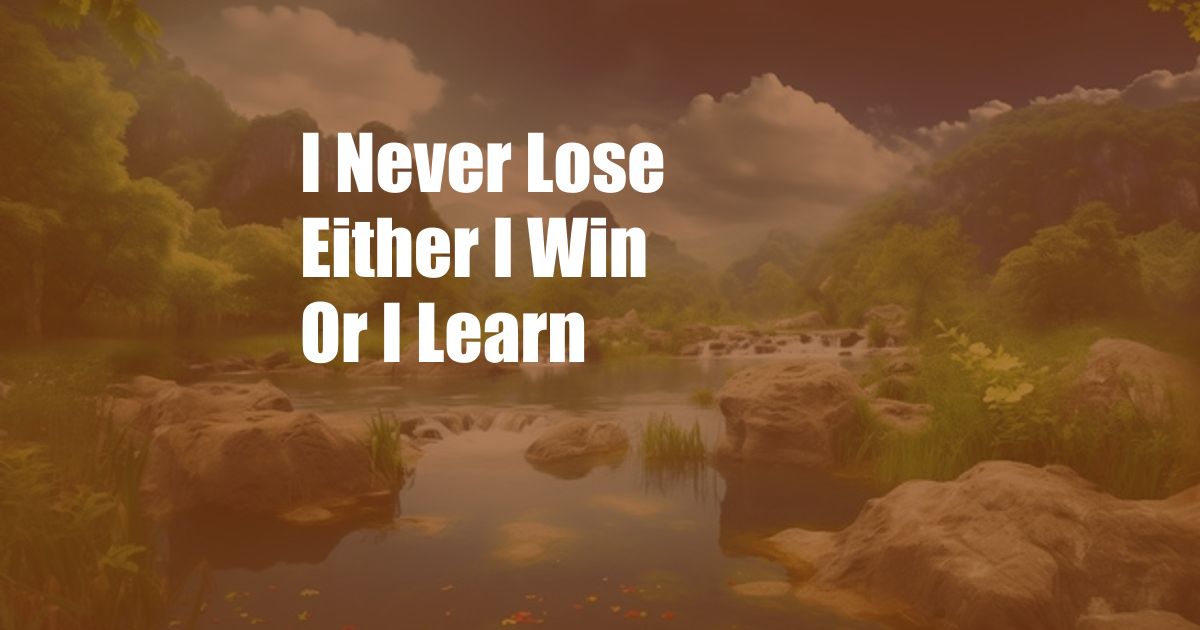
I Never Lose: Either I Win or I Learn
From the moment I uttered my first words, I was instilled with the concept of victory. My parents and mentors always emphasized the importance of striving for excellence and achieving success. They taught me that failure was inevitable but temporary setback that should not deter me from pursuing my goals. Armed with this unwavering belief, I embarked on a quest for knowledge and achievement, knowing that along the path, I would inevitably encounter obstacles and challenges.
Little did I know that this philosophy would become the guiding principle of my life, shaping my outlook and informing my journey. As I matured and ventured into the world beyond the confines of the classroom, I discovered that the real battles were not always fought on physical battlefields or in academic halls, but within the recesses of our own minds. It was in facing these internal struggles that the true meaning of victory would be revealed.
Embracing Failure as a Stepping Stone to Success
In the pursuit of success, it is easy to become fixated on outcomes, to measure our worth by the attainment of specific goals. However, it is in acknowledging our failures that we truly unlock our potential for growth. Failure is not a mark of inadequacy or weakness, but rather an opportunity for reflection and improvement. Each setback, each misstep, becomes a stepping stone on the path to mastery. By embracing failure, we gain valuable lessons that would otherwise remain hidden. We learn to identify our weaknesses, to challenge our assumptions, and to adapt our strategies more effectively.
True victory lies not in the absence of failures but in the ability to learn from them, to rise above them, and to use them as fuel for future success. It is through this process of continuous learning and improvement that we achieve our greatest triumphs, not only in our professional and academic pursuits but in all aspects of our lives.
The Power of Mindset in Shaping Outcomes
Our mindset, more than any external circumstance, determines our ability to achieve success. A fixed mindset views intelligence and ability as static traits, believing that we are either born with them or we are not. This mindset limits our potential, as it leads us to avoid challenges and to give up easily in the face of adversity. In contrast, a growth mindset views intelligence and ability as malleable qualities that can be developed through effort and perseverance. This mindset fosters a love of learning and a willingness to embrace challenges, as we believe that we can improve our abilities through hard work and dedication.
When we adopt a growth mindset, we open ourselves up to a world of possibilities. We become more resilient in the face of setbacks, more willing to take risks, and more persistent in pursuing our goals. We understand that success is not a destination but a journey, a continuous process of progress and improvement. By embracing a growth mindset, we unlock our true potential and set ourselves on a path to lifelong success.
Developing a Growth Mindset
Developing a growth mindset is not an overnight process, but rather a gradual shift in our thinking and behavior. Here are a few tips to help you cultivate a growth mindset:
- Embrace challenges: See challenges as opportunities for growth and learning.
- Learn from your mistakes: Mistakes are inevitable, but they provide valuable lessons for improvement.
- Perseverance is key: Don’t give up easily, but instead persist in the face of obstacles.
- Seek feedback: Constructive feedback helps you identify areas for improvement.
- Celebrate your progress: Acknowledge your accomplishments, no matter how small.
By incorporating these principles into your life, you can develop a growth mindset, unlocking your potential for success and achieving your goals.
FAQs on Growth Mindset
Q: What is the difference between a fixed mindset and a growth mindset?
A: A fixed mindset views intelligence and ability as static traits, while a growth mindset views them as malleable qualities that can be developed through effort and perseverance.
Q: How can I develop a growth mindset?
A: Embrace challenges, learn from your mistakes, persevere in the face of obstacles, seek feedback, and celebrate your progress.
Q: What are the benefits of having a growth mindset?
A: A growth mindset fosters a love of learning, resilience in the face of setbacks, willingness to take risks, and persistence in pursuing goals.
Q: Can a person with a fixed mindset change to a growth mindset?
A: Yes, it is possible to shift from a fixed mindset to a growth mindset through conscious effort and a willingness to change.
Conclusion
In the grand tapestry of life, we are all faced with a choice: to succumb to setbacks and limitations or to embrace them as opportunities for growth. The path of least resistance may offer temporary solace, but true victory lies in the pursuit of knowledge, the embracing of challenges, and the continuous striving for improvement. When we adopt a mindset that embraces failure as a stepping stone to success, we unlock our true potential and set ourselves on a path of lifelong achievement.
Are you ready to embrace the growth mindset and unlock your full potential?